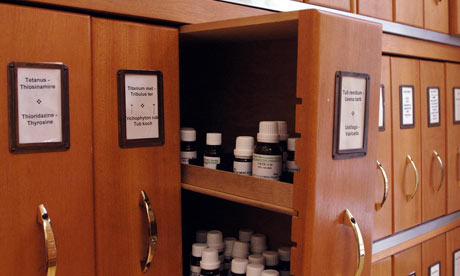
Today the Science and Technology Select Committee delivered its verdict on homeopathy and it was devastating. The committee has called for the complete withdrawal of NHS funding and official licensing of homeopathy.
This should come as no surprise to anyone who witnessed the almost farcical nature of the proceedings, with the elite of homeopathy mocked by their own testimony. Peter Fisher, director of the Royal London Homeopathic Hospital, spewed forth the sort of dialogue that wouldn't look out of place in a Terry Pratchett novel. As the report drily observes:
"Dr Fisher stated that the process of 'shaking is important' but was unable to say how much shaking was required. He said 'that has not been fully investigated' but did tell us that 'You have to shake it vigorously [...] if you just stir it gently, it does not work'.
Quite. It's hard to say which is more ridiculous: the sight of a grown man speaking this nonsense, or the fact that after 200 years homeopaths apparenly haven't bothered to "fully investigate" how much shaking is required for their remedies to work. And yet, bizarrely, these people expect to be taken seriously.
In this they have failed spectacularly. The select committee report has brutally inflicted the 21st, 20th and 19th centuries on this 18th century magic ritual, and under inspection it has fallen apart.
As I reported previously in the Guardian, much of the evidence presented by homeopaths simply does not stand up to scrutiny, and the committee agrees, concurring with the government, the scientific community and independent experts in concluding that: "the systematic reviews and meta-analyses conclusively demonstrate that homeopathic products perform no better than placebos."
Even the claims that more research is needed have been rebutted. Plenty of evidence has accumulated regarding the effectiveness of homeopathy, and a verdict has been reached. It is useless. As the report states: "It is ... unethical to enter patients into trials to answer questions that have been settled already."
Even more damning is the MPs' assessment of the competence of homeopaths in handling evidence. In a strongly worded statement clearly directed at the British Homeopathic Association (BHA), the report expresses disappointment at the behaviour of homeopaths submitting evidence to the evidence check:
"We regret that advocates of homeopathy, including in their submissions to our inquiry, choose to rely on, and promulgate, selective approaches to the treatment of the evidence base as this risks confusing or misleading the public, the media and policy-makers."
The BHA's behaviour throughout the evidence check has been an embarrassment to homeopathy. After my allegation that the BHA had misrepresented evidence to MPs, the author of the association's submission to the committee, homeopath Robert Mathie, in particular should have made a public apology for allowing his standard of scholarship to slip.
But the BHA instead chose to attack me in a press statement that contained still further misrepresentations of the evidence.
Mathie and the BHA should take the report's criticisms on the chin, accept that they are in error, and reflect on how they present evidence to the public in the future.
Sadly, the criticism is likely to fall on deaf ears. Rather than take the opportunity to reassess their approach, homeopaths are filling blogs and tweets with dark imaginings of vast, Big Pharma-controlled conspiracies against their noble art, painting a vivid picture of the fantasy world that they appear to inhabit.
Of course, as Peter Fisher's comments reveal, a grand conspiracy is not neccesary to discredit homeopathy. The most effective way to do that is simply to let a homeopath speak.
But it's not just homeopaths we should be criticising. The government, and in particular the MHRA (Medicines and Healthcare products Regulatory Agency, which licenses drugs and oversees labelling), also come in for some strong criticism from the committee. Both stand accused of hypocrisy for paying lip-service to the importance of evidence-based medicine while allowing special exemptions for dubious practices.
In the words of the committee, the government's position on homeopathy is "confused". It accepts that homeopathy is effectively a placebo, but allows it to be practised within the NHS without considering the ethics of prescribing placebos to patients.
Members of the committee were shocked to find that the rigorous rules the MHRA normally applies for licensing medicines were simply abandoned in the case of homeopathy. That the MHRA allows health claims to be made for medicines that cannot be shown to work suggests a failure to live up to its own standards.
Even more damning is the committee's verdict on the labels that the MHRA deems acceptable for use on homeopathic Arnica, labels that were tested by the MHRA itself. The report states: "We conclude that the user-testing of the Arnica Montana 30C label was poorly designed with parts of the test actively misleading participants."
Clearly, MHRA chief executive Kent Woods has serious questions to answer regarding how his agency came to allow a homeopathic treatment through the net.
The report also represents a victory for the blogosphere. Sceptical bloggers such as Andy Lewis and 'Gimpy' have been pursuing homeopaths and leading homeopathic organisations for years, whether exposing the funding of hideously unethical Aids trials in Africa, or doggedly harrying the MHRA over its failure to appropriately regulate labelling.
Today, these bloggers are relieved that MPs are finally paying attention. Lewis expressed happiness that the behaviour of those selling homeopathic remedies had come under parliamentary scrutinity, while Gimpy observed that, "this issue is no longer just a concern within the blogosphere but is now a matter for parliament."
For homeopaths, the message is clear. Their attempts to defend their position in the face of questioning from MPs have ended in humiliation and embarrassment. It is clear that they have no credible evidence to support their remedies.
Time, perhaps, to pick a new profession.
Martin Robbins writes for The Lay Scientist

